Services for Older Adults
Learning Circles
Charlotte Readers Podcast

Keep learning fun with Summer Break - Read, Learn, Explore
May 8, 2019
Charlotte Mecklenburg Library encourages reading and learning all year long. The summer months, when students take a break from school, are critical to expanded learning. In fact, summer time poses the most academic risk because students without access to summer learning opportunities can fall behind their peers, creating an achievement gap that is hard to close.
To keep kids on track with important matters such as literacy and physical activity, the Library offers Summer Break, its annual summer learning program that encourages children to read, learn and explore.
This year, the program runs June 1 – August 10 and pre-registration begins Monday, May 20 here.
The Library offers early registration to give students a head-start at signing up before school is out. Participants can create a free online account to track reading time, learning and leisure activities from June 1 to August 10. Summer Break encourages participants of all ages – children, teens and adults – to read 20 minutes per day and engage in additional learning activities such as writing, creating, playing, exploring and giving. As participants track their activities online, they collect virtual badges and incentives.
Summer Break participants complete the program after reading 20 hours OR by reading at least 10 hours and completing 10 learning activities. Participants who complete the program, have a valid library card number listed on their account and log activities or reading time online for 10 out of 10 weeks, will also be eligible to receive one Carowinds ticket. These tickets will be valid at Carowinds through the end of the 2019 season. Tickets can be claimed starting on Saturday, August 10 and are available while supplies last.
Looking to make the most of summer? Visit the official Summer Break website, summerbreak.cmlibrary.org, to discover reading lists and plenty of enriching ideas and activities. The Library also offers thousands of free programs during the summer to engage the community in a wide variety of fun and educational experiences; special kickoff events are listed below. Come to any of these kickoff events, sign up for Summer Break and get a $5 voucher toward library fines and a coupon for a free Jr. Frosty from Wendy's.
Parents of young children (and parents too!) won’t want to miss the interactive summer exhibit hosted through September at ImaginOn: TheJoe & Joan Martin Center - The Adventures of MR. POTATO HEAD! The exhibit opens May 25 - September 8, 2019 at ImaginOn.
The 2019 Summer Break program is brought to you by Charlotte Mecklenburg Library in partnership with Carowinds. Additional support comes from Wendy’s and the Charlotte Mecklenburg Library Foundation.
Summer Break Kickoff Events Kickoff
Cick here for all Summer Break Kickoff events

Charlotte Today: Celebrating parenthood
May 9, 2019
Library Branch Channel Leader and Interim Director of Libraries, Dana Eure, made a guest appearance on WCNC's Charlotte Today on Thursday, May 9, 2019 and shared six titles on celebrating parenthood. Click here to search the titles.
The Cactus
by Sarah Haywood
For Susan Green, messy emotions don't fit into the equation of her perfectly ordered life. She has a flat that is ideal for one, a job that suits her passion for logic and an 'interpersonal arrangement' that provides cultural and other, more intimate, benefits. But suddenly confronted with the loss of her mother and the news that she is about to become a mother herself, Susan's greatest fear is realized. She is losing control. When she learns that her mother's will inexplicably favors her indolent brother, Edward, Susan's already dismantled world is sent flying into a tailspin. As Susan's due date draws near and her family problems become increasingly difficult to ignore, Susan finds help and self-discovery in the most unlikely of places.
One Day You'll Thank Me
Lessons From An Unexpected Fatherhood
by David McGlynn
Fatherhood caught David McGlynn by surprise. His sons arrived in quick succession - the first when the author was a dirt-poor student and the second not long after he'd moved his family across the country to start a new job in bucolic Wisconsin. As a result, McGlynn found himself colliding with fatherhood, at once scared to death and utterly thrilled. Just like many new fathers, he hopes he's doing the right thing - but he's never quite sure. One Day You'll Thank Me translates the small, often hilarious moments common among parents of young children, especially dads, into "life lessons" about fatherhood. Comprised of interconnected chapters, many of which have appeared in such prominent publications as The New York Times, Men's Health, Parents, Real Simple and O, The Oprah Magazine, the stories invoke a sense of humor and honesty that expand our understanding of what it means to be an American dad.
Everything Is Mama
by Jimmy Fallon
Everything is...MAMA! Jimmy Fallon, one of the most popular entertainers in the world and NBC's Tonight Show host, was on a mission with his first children's book to have every baby's first word be DADA. And it worked! A lot of babies' first words were DADA. However, everything after that was MAMA. So, take a lighthearted look at the world from your baby's point of view as different animals try to teach their children that there are other words in addition to MAMA for familiar objects and activities.
I've Loved You Since Forever
by Hoda Kotb
I've Loved You Since Forever is a celebratory and poetic testament to the timeless love felt between parent and child. This beautiful picture book is inspired by Today show co-anchor Hoda Kotb's heart-warming adoption of her baby girl, Haley Joy. With Kotb's lyrical text and stunning pictures by Suzie Mason, young ones and parents will want to snuggle up and read the pages of this book together, over and over again. In the universe, there was you and there was me, waiting for the day our stars would meet P
Papasaurus
by Stephan Lomp
Babysaurus loves to play hide-and-seek in the jungle with his Papasaurus, but one day Papasaurus hides and Baby cannot find him -- so he asks the other dinosaurs, Stego, Anky, Velo and others, for help finding his father.
Moxie
A Novel
by Jennifer Mathieu
Punk rock zines inspire a feminist revolution at a small-town Texan high school in the new novel from Jennifer Mathieu, author of The Truth About Alice. MOXIE GIRLS FIGHT BACK! Vivian Carter's mom was a Riot Grrrl in the 1990s, but now she and Viv live a pretty quiet life in a small Texas town. When Viv witnesses a series of sexist incidents at her high school, she takes a page from her mom's past and makes a feminist zine that she distributes anonymously to her classmates. Viv is just blowing off steam, but before she knows it, she's started a revolution. This novel offers everything fans love about Mathieu's writing -- a relatable protagonist with a distinct voice, a conflict relevant to current events and, ultimately, a story that is both heartbreaking and hopeful.
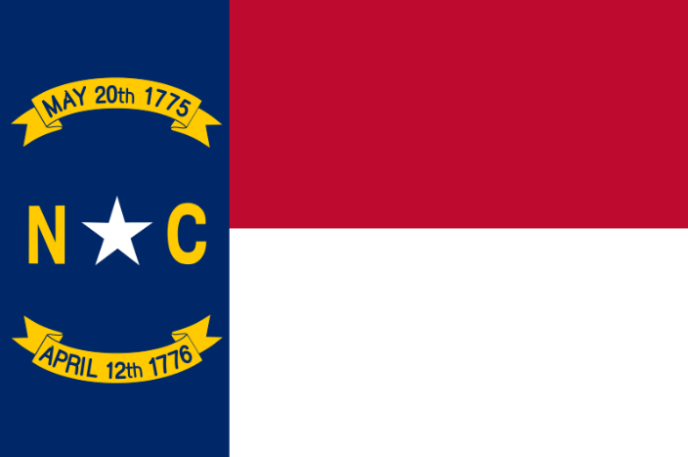
Part I: Is the Mecklenburg Declaration of Independence real or fake?
May 10, 2019
(Already read Part I? Jump ahead to Part II.)
Part I: Background History
“Meck Dec Day” is an annual celebration in Charlotte, North Carolina in observance of the alleged first declaration of independence against British rule. North Carolina’s flag even references the document's creation date, May 20, 1775. It has long been debated whether the document is authentic or if it is a misinterpretation of the Mecklenburg Resolves.
For the believers, it was created by approximately 25 leading Mecklenburg citizens who had gathered at the Courthouse on May 19, 1775 to discuss the troublesome relationship between England and the American Colonies. Each local militia company sent two representatives to the courthouse. Relations between the colonies and the mother country had reached crisis in Boston, Massachusetts, following the 1774 passage of the Coercive Acts by the British Parliament.
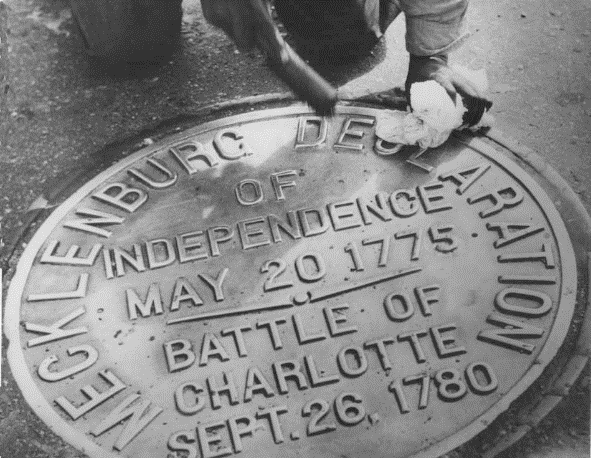
During the meeting in Mecklenburg County, the delegates received official news that the Battle of Lexington was fought in Massachusetts just one month earlier. Outraged by this turn of events, the delegates unanimously passed the following resolutions at about 2:00 a.m. on May 20:
1. Resolved, That whosoever directly or indirectly abetted, or in any way, form, or manner, countenanced the uncharted and dangerous invasion of our rights, as claimed by Great Britain, is an enemy to this County, to America, and to the inherent and inalienable rights of man.
2. Resolved, That we the citizens of Mecklenburg County, do hereby dissolve the political bands which have connected us to the Mother Country, and hereby absolve ourselves from all allegiance to the British Crown, and abjure all political connection, contract, or association, with that Nation, who have wantonly trampled on our rights and liberties and inhumanly shed the innocent blood of American patriots at Lexington.
3. Resolved, That we do hereby declare ourselves a free and independent people, are, and of right ought to be, a sovereign and self-governing Association, under the control of no power other than that of our God and the General Government of the Congress; to the maintenance of which independence, we solemnly pledge to each other, our mutual cooperation, our lives, our fortunes, and our most sacred honor.
4. Resolved, That as we now acknowledge the existence and control of no law or legal officer, civil or military, within this County, we do hereby ordain and adopt, as a rule of life, all, each and every of our former laws - where, nevertheless, the Crown of Great Britain never can be considered as holding rights, privileges, immunities, or authority therein.
5. Resolved, That it is also further decreed, that all, each and every military officer in this County, is hereby reinstated to his former command and authority, he acting conformably to these regulations, and that every member present of this delegation shall henceforth be a civil officer, viz. a Justice of the Peace, in the character of a 'Committee-man,' to issue process, hear and determine all matters of controversy, according to said adopted laws, and to preserve peace, and union, and harmony, in said County, and to use every exertion to spread the love of country and fire of freedom throughout America, until a more general and organized government be established in this province.
6. That a copy of these resolutions be transmitted by express to the President of the Continental Congress assembled in Philadelphia, to be laid before that body. The signers were reported to include:
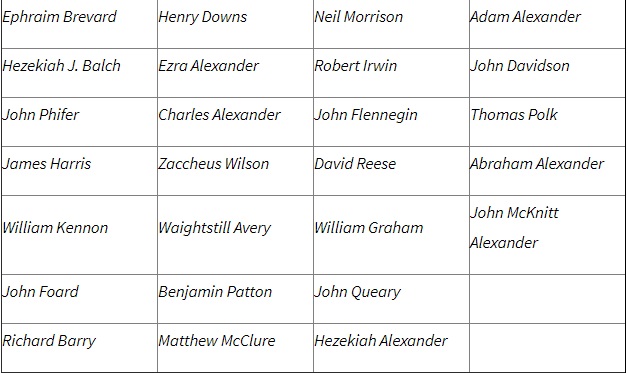
The document in question was written by John McKnitt Alexander, clerk of the meeting. If the story is true, the Mecklenburg Declaration preceded the United States Declaration of Independence by more than a year. The unfortunate part is that there was no contemporary publication of the document.
In 1938, the Signers Chapter of the Daughters of the American Revolution (DAR) marked the graves of the signers to honor them.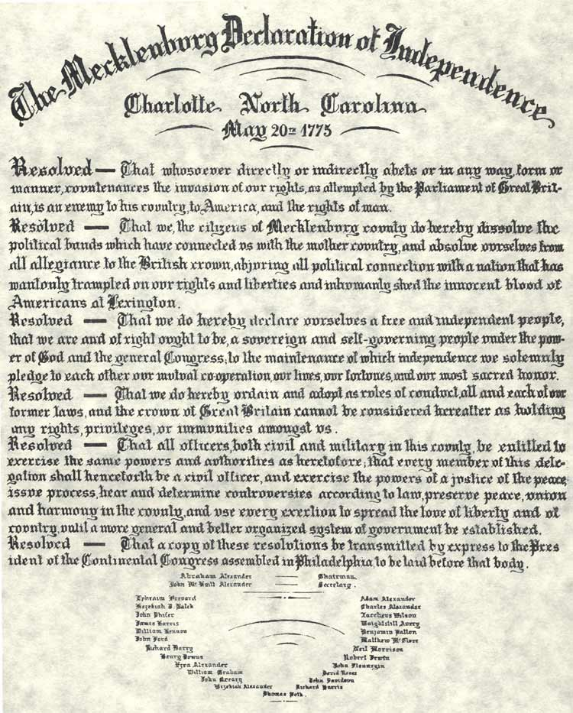
A few days after the adoption of the Mecklenburg Declaration, Captain James Jack of Charlotte was sent to the Continental Congress in Philadelphia. Jack carried a copy of the resolves and a letter asking North Carolina's congressmen to have the Mecklenburg proceedings approved by Congress. The North Carolina congressional delegation -- Richard Caswell, William Hooper and Joseph Hewes -- told Jack that, although they supported what was done, it was premature to discuss a declaration of independence in Congress.
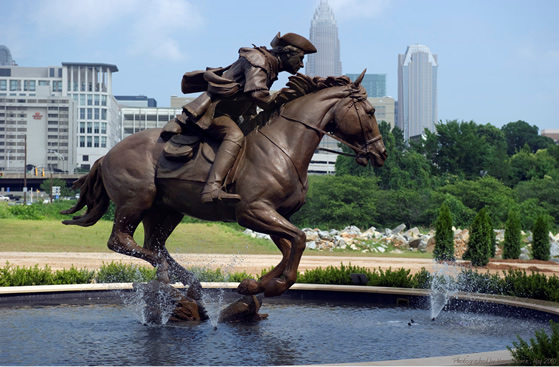 Interestingly enough, Jack’s ride was documented in Moravian texts, which recounted the dates he traveled through Salem. The document has not yet been found among the papers of Caswell, Hooper or Hewes.
Interestingly enough, Jack’s ride was documented in Moravian texts, which recounted the dates he traveled through Salem. The document has not yet been found among the papers of Caswell, Hooper or Hewes.
The original document was burned in 1800 when the home of Alexander, named Alexandriana, burned down. There is no verifiable evidence to confirm the original document's existence and no reference to it has been found in extant newspapers from 1775.
The Mecklenburg Declaration of Independence was first published on April 30, 1819 in an article written by Dr. Joseph McKnitt Alexander in the Raleigh Register and North Carolina Gazette, of Raleigh, North Carolina. “It is not probably known to many of our readers,” wrote the editor of the Raleigh Register in an introduction to the article, "that the citizens of Mecklenburg County, in this State made a Declaration of Independence more than a year before Congress made theirs."
The early government of North Carolina, convinced that the Mecklenburg Declaration was genuine, maintained that North Carolinians were the first Americans to declare independence from Great Britain. As a result, both the seal and the flag of North Carolina bear the date of the declaration.
Enjoying reading about the Mecklenburg Declaration of Independence? Stay posted for the next installment of this four-part series on Monday, May 15, 2019.
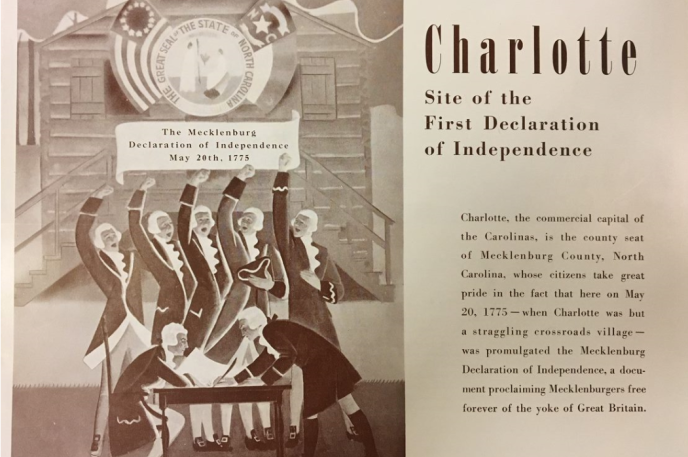
Part II: The Mecklenburg Declaration of Independence and the Mecklenburg Resolves
May 14, 2019
(Already read Part II? Jump ahead to Part III.)
NOTE: This post is part two in a four-part series that explores the Mecklenburg Declaration of Independence. Click here to read part one.
Eleven days after the adoption of the Mecklenburg Declaration, another document emerged called the Mecklenburg Resolves. The Mecklenburg Resolves, created by the Mecklenburg County Committee of Safety on or after May 20, 1775, was adopted by that same committee on May 31, 1775.
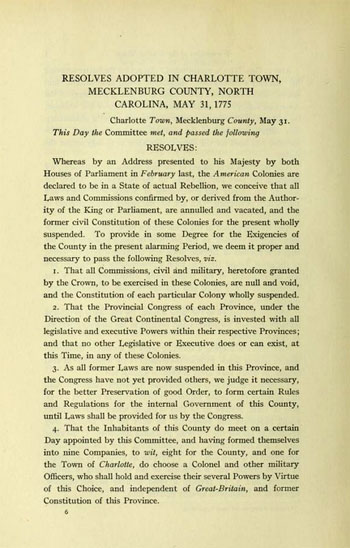 This document adopted a set of radical resolutions that fell short of an actual declaration of independence. The Resolves proclaimed that "all Laws...derived from the Authority of the King or Parliament, are annulled and vacated," and that the Provincial government "under the Great Continental Congress is invested with all legislative and executive Powers...and that no other Legislative or Executive does or can exist, at this Time, in any of these Colonies." The Resolves further suspended the actions of the royal military and civil officials, called for the other colonies to govern themselves through provincial congresses and arrest royal officials who continued their political duties in North Carolina. Following the Mecklenburg Resolves, similar lists were published by other North Carolina counties.
This document adopted a set of radical resolutions that fell short of an actual declaration of independence. The Resolves proclaimed that "all Laws...derived from the Authority of the King or Parliament, are annulled and vacated," and that the Provincial government "under the Great Continental Congress is invested with all legislative and executive Powers...and that no other Legislative or Executive does or can exist, at this Time, in any of these Colonies." The Resolves further suspended the actions of the royal military and civil officials, called for the other colonies to govern themselves through provincial congresses and arrest royal officials who continued their political duties in North Carolina. Following the Mecklenburg Resolves, similar lists were published by other North Carolina counties.
Newspapers published in 1775 document the Resolves. The text of the Resolves was lost after the American Revolution and not rediscovered until 1838.
Enjoying reading about the Mecklenburg Declaration of Independence? Stay posted for installment three of this four-part series which leads up to Meck Dec Day on May 20. Expect the next installment in this series on Friday, May 17.
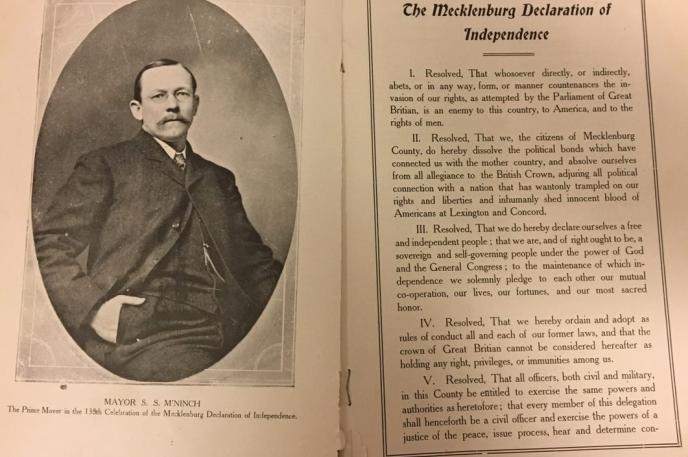
Part III: the Mecklenburg Declaration of Independence meets controversy
May 17, 2019
(Already read Part II? Jump ahead to Part IV.)
NOTE: This post is part three in a four-part series that explores the Mecklenburg Declaration of Independence. Don’t forget to read parts one and two.
Either these resolutions are a plagiarism from Mr. Jefferson's Declaration of Independence, or Mr. Jefferson's Declaration of Independence is a plagiarism from those resolutions.
—John Adams, August 21, 1819
The Mecklenburg Declaration and the Declaration of Independence had several similar phrases, including "dissolve the political bands which have connected," "absolve ourselves from all allegiance to the British Crown," "are, and of right ought to be" and "pledge to each other, our mutual cooperation, our lives, our fortunes, and our most sacred honor."
Did Thomas Jefferson, the principal author of the American Declaration of Independence, use the Mecklenburg Declaration as a source? Had he seen the Mecklenburg Declaration? Was the language used in both documents common for the day?
 Former President Thomas Jefferson, principal author of the United States Declaration of Independence, suspected that the Mecklenburg Declaration was a hoax. John Adams agreed with Jefferson. When Adams read Dr. Alexander's 1819 article in a Massachusetts newspaper, he was astonished because he had never previously heard of the Mecklenburg Declaration. He immediately assumed, as he wrote a friend, that Jefferson had "copied the spirit, the sense, and the expressions of it verbatim into his Declaration of the 4th of July 1776." Adams had played a role in getting the Continental Congress to declare independence in 1776 and was, therefore, somewhat resentful that Jefferson received most of the praise. Adams sent a copy of the article to get Jefferson’s reaction.
Former President Thomas Jefferson, principal author of the United States Declaration of Independence, suspected that the Mecklenburg Declaration was a hoax. John Adams agreed with Jefferson. When Adams read Dr. Alexander's 1819 article in a Massachusetts newspaper, he was astonished because he had never previously heard of the Mecklenburg Declaration. He immediately assumed, as he wrote a friend, that Jefferson had "copied the spirit, the sense, and the expressions of it verbatim into his Declaration of the 4th of July 1776." Adams had played a role in getting the Continental Congress to declare independence in 1776 and was, therefore, somewhat resentful that Jefferson received most of the praise. Adams sent a copy of the article to get Jefferson’s reaction.
Jefferson replied that, like Adams, he had never heard of the Mecklenburg Declaration before. Jefferson found it curious that historians of the American Revolution, even those from North Carolina and nearby Virginia, had never previously mentioned it. He also found it suspicious that the original was lost in a fire and that most of the eyewitnesses were now dead. Jefferson wrote that while he could not claim for certain that the Mecklenburg Declaration was a fabrication, "I shall believe it such until positive and solemn proof of its authenticity shall be produced."
Jefferson's argument, Adams wrote in reply, "has entirely convinced me that the Mecklenburg [sic] Resolutions are a fiction.” Thus began centuries of controversy.
North Carolina Senator Nathaniel Macon collected eyewitness testimony to the events described in the article. The then elderly witnesses did not agree with every detail, but they generally corroborated the story that a declaration of independence had been publicly read in Charlotte, although they were not all certain about the date. Perhaps most importantly, 88-year-old Captain James Jack was still alive and was able to confirm that he delivered a declaration of independence to the Continental Congress that had been adopted in May 1775.
Enjoying reading about the Mecklenburg Declaration of Independence? Stay posted for installment three of this four-part series which leads up to Meck Dec Day on May 20. Expect the next installment in this series on Monday, May 20.
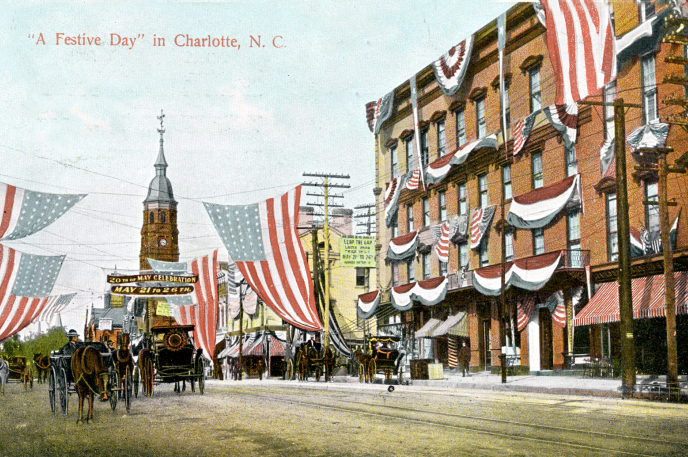
Part IV: Celebrating the Mecklenburg Declaration of Independence!
May 17, 2019
NOTE: This is the final installment in a four-part series that explores the Mecklenburg Declaration of Independence. Click accordingly to read parts one, two and three.
“The City of Charlotte has documented many celebrations of Meck Dec Day, with the first known celebration occurring in 1825. The Charlotte Observer frequently covered the events of Meck Dec Day in the daily paper….” Newspaper excerpt:
The Fireworks Tonight 5/20/1891 p.1 The expert sent here to superintend the fireworks display tonight has been hard at work all day, and has everything arranged for a great display. The display will be given at the graded school grounds, at 8 o’clock, and will be the most elaborate ever given in the State. Some of the bombs will go half a mile high, and that part of the show can be enjoyed by our neighbors for 20 miles around. The display last year was a magnificent one, but the display to be made tonight will be a still better one. The set pieces and the figures in the air will be worth seeing. Every visitor who sees the fireworks display will feel repaid by that show alone for the trip to Charlotte. Take THE NEWS’ word for that.
During the celebration, three balloons were released. One of the balloons had a deed to a lot in Dilworth:
BROWN GETS THE DEED. 5/21/1891 p.1 The Balloon is Found by the Side of the Beattie’s Ford Road Six Miles From Town, by J. E. Brown, Who Gets a Lot in Dilworth. One of the original features of the fireworks display last night, was the sending up of a balloon, to which was attached a tin box, bearing a certificate that the finder would be entitled to a deed for a lot in Dilworth. Three balloons were sent up. The certificate was carried by the second balloon. All three balloons sailed high over the city in a northwesterly direction. The first balloon landed at Biddleville. The second sailed out of sight; the third was burned by fireworks at a great height. This morning, as Mr. J. E. Brown, who lives near the Capp’s Hill Mine, was coming to town, his attention was attracted by a balloon lying in a field by the Beattie’s Ford Road six miles from town. He picked up the balloon and saw the tin box attached. He broke open the box and found the certificate entitling him to a lot in Dilworth. The certificate was signed by E. D. Latta, president and J. L. Chambers, secretary, and called for a deed to lot No. 2, in block 69. That block is located in the southern portion of Dilworth, and the lot fronts on Springville Avenue. It is one of the prettiest lots in Dilworth.
As you’ve likely been able to infer, Meck Dec Day is a huge deal for Charlotteans. So much so, that the city asked and successfully hosted four United States presidents: William Howard Taft, Woodrow Wilson, Dwight D. Eisenhower and Gerald Ford.
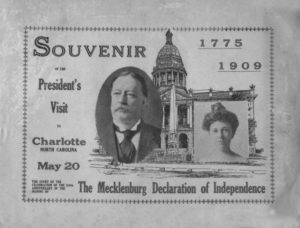
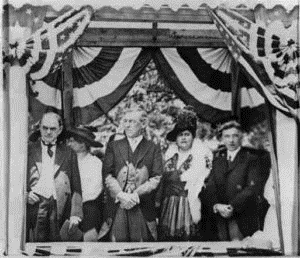
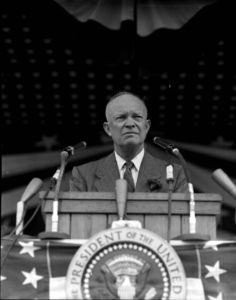

In 1995, the Meck Dec Day celebration was re-established to take place annually at Independence Square on the crossing of Trade and Tryon Streets in Uptown Charlotte. Independence Square has four statues, each in one corner of the square to represent Transportation, The Future, Commerce and Industry.
Happy Meck Dec Day!
--
REFERENCES
Inscoe, Corey. 5 Things you Probably Didn’t Know about Meck Dec Day—and How To Celebrate this Weekend. Charlotte Five. Accessed May 2019. https://www.charlottefive.com/meck-dec-day-2017/
Kent, Tricia. Five Facts to Know About Meck Dec Day. UNC-Charlotte. Accessed May 2019. https://inside.uncc.edu/news-features/2018-05-18/five-facts-know-about-meck-dec-day
Robinson-Spangler Carolina Room. 1891 Mecklenburg Declaration of Independence Celebrations. CMStory. Accessed May 2019. https://www.cmstory.org/exhibits/mecklenburg-declaration-independence-celebration-timeline/1891-mecklenburg-declaration
Syfert, Scott. The First American Declaration of Independence? The Disputed History of the Mecklenburg Declaration of Independence of May 20, 1775. Jefferson, North Carolina: McFarland Company, Inc., 2014.
Williams, Jim. The Mecklenburg Declaration: The Celebrations. Mecklenburg Historical Association. Accessed May 2019. https://www.meckdec.org/declaration/the-celebrations
IMAGES
Captain Jack Statue. Image. Accessed May 2019. https://www.mecknc.gov/ParkandRec/TrailOfHistory/Pages/CaptainJack.aspx
Mecklenburg Declaration Sidewalk Plaque. Image. Accessed May 2019. https://www.cmstory.org/exhibits/robinson-spangler-north-carolina-room-image-collection-hornets-nest/mecklenburg-declaration
Mecklenburg Resolves. Image. Accessed May 2019. https://archive.org/stream/documentsillustr00libr#page/6/mode/2up
North Carolina State Flag. Image. Accessed May 2019. https://statesymbolsusa.org/symbol-official-item/north-carolina/state-flag/flag-north-carolina
